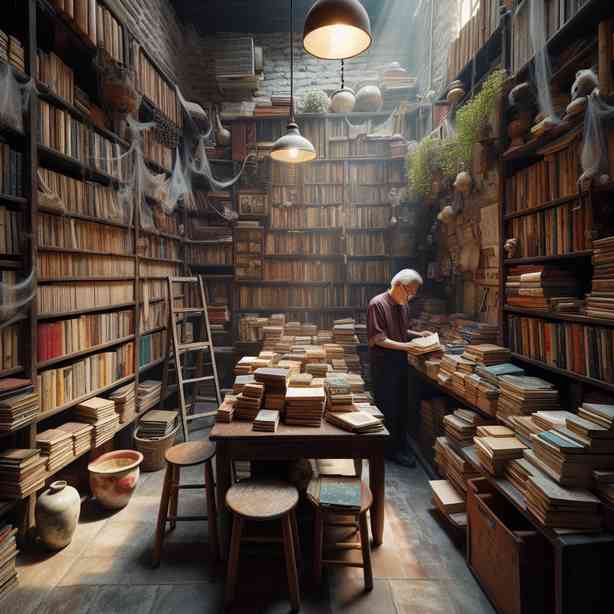
The smell of a used bookstore is a sensory experience that many book lovers cherish. It is a combination of the aged paper, the binding, and the unique odors that come from the myriad of books that have been treasured by previous readers. This olfactory sensation is not just a byproduct of the physical space but also evokes a sense of nostalgia and wonder. As you step into a used bookstore, the initial whiff that greets you is often reminiscent of time spent in libraries or cherished reading nooks at home, inviting you to embark on a journey through the pages of history and imagination.
The scent itself can be attributed to a variety of factors. Used books often carry the residual fragrances of the environments in which they were stored. Books that have spent years safely nestled on shelves in homes, coffee shops, or even dusty attics will inevitably soak up a plethora of smells—from the musky aroma of aging paper to the faint scent of coffee or even a hint of leather from their bindings. Each book has a story not just in its text but in its physical form, informing readers of its previous life and context.
Visiting a used bookstore is akin to stepping into a time capsule. The physical atmosphere—a blend of dim lighting, crowded shelves, and eclectic decor—enhances the overall experience. As you navigate through narrow aisles and feathery dust particles illuminated by filtered sunlight, you can’t help but feel a sense of reverence for the stories waiting to be uncovered. Each book you touch and each spine you admire tells a tale of its own, whispering secrets of its adventures and experiences.
Moreover, the experience of browsing through used books is inherently different from the sleek, curated displays often found in new bookstores. In a used bookstore, the organization is often less about genre and more about the serendipity of discovery. You might find a novel hidden among art books or a classic collection buried beneath a pile of contemporary fiction. This delightful chaos invites readers to let go of their preconceived notions of what they are looking for and instead embrace the unexpected finds that may resonate with them.
The tactile sensation of flipping through pages—yellowed and fragile or crisp and fresh—adds another layer to this experience. It’s a reminder of the physicality of reading, a process that is as much about the book itself as it is about the words contained within. Running your fingers along the spines, feeling the textured covers, and even smelling the pages becomes a form of engagement that digital formats simply can’t replicate. There is something comforting in holding a book, feeling its weight, and absorbing its essence through the senses.
As you delve into the depths of a used bookstore, you’ll encounter a community of fellow literary enthusiasts. The charm of these stores often attracts a diverse group of people, including avid readers, collectors, and casual visitors. Each person brings their unique perspective and history with books, generating conversations that revolve around genres, recommendations, and shared experiences. It fosters a sense of belonging, a reminder that the love for literature transcends demographics and backgrounds.
The atmosphere pulsates with a vibrancy that echoes the stories told within those walls. Strangers may strike up conversations about a particular author or a shared favorite book. Many used bookstores host events such as book readings, signings, or even discussions, further enhancing the communal aspect of the experience.
In addition to the sense of community, there is also a palpable sense of adventure. Whether it’s stumbling upon a long-lost favorite title or discovering an obscure gem, each visit can yield delightful surprises. The thrill of browsing—taking your time to examine titles, uncover hidden treasures, and reignite long-forgotten passions—is unparalleled. For many, it feels like a scavenger hunt, with the reward being not just a book, but also the memories and emotions that come with it.
Moreover, the process of thrifting for literature often holds an element of sustainability that appeals to modern readers. In an age where environmental consciousness is increasingly important, choosing to buy used books is a tangible step towards reducing waste. It aligns with a growing movement that advocates for mindful consumption, wherein individuals make choices that not only serve personal interests but also contribute positively to the community and surroundings.
Used bookstores often have a rich history of their own, serving as small businesses that thrive on a local level. Many are family-owned and carry their unique character, shaped by the choices of the owners who curate their selections. This personal touch can be felt through the recommendations made by knowledgeable staff, who often share their favorite reads or assist customers in finding something special. Building these relationships adds depth to the experience, creating a connection that extends beyond just the transaction.
As you explore further, you may also find that many used bookstores host small art exhibits, local crafts, or even a cozy reading nook where visitors can stop to leaf through their newfound treasures. These elements contribute to a unique ambiance that transforms a simple book-buying trip into an immersive experience—where literature meets art, community, and sustainability.
In conclusion, the smell of a used bookstore is more than just a pleasant scent; it embodies history, community, and an unyielding passion for literature. This intoxicating aroma invites readers into a space where they can explore, discover, and connect with stories from the past. Each visit can evoke a different emotion, be it nostalgia, excitement, or curiosity. Thus, for those who cherish reading, the experience of spending time at a used bookstore is not just about acquiring books; it is a multitude of sensory delights that enriches the soul and nurtures the mind. So the next time you happen upon a quaint, charming used bookstore, take a deep breath, let the aroma envelop you, and prepare to immerse yourself in a world of literary wonders waiting to be discovered.


